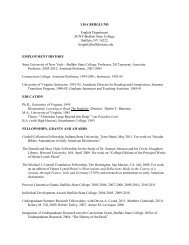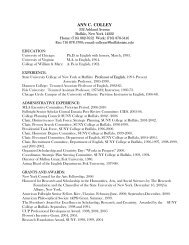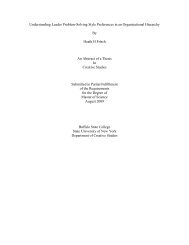POLITICS VERSUS SCIENCE: APPORTIONING ... - Buffalo State
POLITICS VERSUS SCIENCE: APPORTIONING ... - Buffalo State
POLITICS VERSUS SCIENCE: APPORTIONING ... - Buffalo State
Create successful ePaper yourself
Turn your PDF publications into a flip-book with our unique Google optimized e-Paper software.
of reliance of harmonization as the implementing process for the attainment of the Single<br />
Economic Market (SEM), with the Commission’s White Paper (1985), the Milan Council<br />
Summit of that year, and the 1987 Council decision clarifying comitology (Nugent 2003,<br />
136) we see the regulatory committee (comitology) [139] increasingly recognized as<br />
having a more important role to play in policy implementation. 7<br />
Two basic views of comitology have emerged in the literature, each a direct result<br />
of the question posed. If the overriding concern is "democracy" and "transparency,"<br />
comitology is often vilified as undemocratic, unrepresentative, non-transparent, and<br />
unaccountable. Wessels (1997, 38) writes: “The extent of legitimacy is after all an<br />
empirical issue: how far do those represented accept the decisions prepared, taken, and<br />
implemented in the EU policy cycle?” Weiler (quoted in St. Clair Bradley 1999, 76)<br />
describes comitology as “a phenomenon which requires its very own science which no<br />
single person has mastered.” Chambers (1999, 100) refers to comitology as “the Council<br />
in the Commission,” part of the “constitutional fudge which glues the Union together by<br />
filling the fundamental gulf between federalism and intergovernmental co-operation. Like<br />
fudge,” she tells us, “it doesn’t make a very stable glue when the temperature rises. If<br />
instead, one seeks to balance supranationalism and federalism, comitology is a practical<br />
way to accommodate this balance. Falling between mutual trust (harmonization) and<br />
independent agencies, the comitology system or deliberative supranationalism (Joerges<br />
and Neyer 1997) is, “a conceptual alternative of the well-known dichotomies between<br />
7 Nugent (2003, 137-138): advisory committees can only advise the Commission; management committees<br />
can block Commission decisions by QMV; regulatory committees must give their approval for<br />
Commission decisions by QMV. It is important to note that comitology did exist prior to the SEA,<br />
especially in the form of a complex agricultural comitology, which successfully combined the national and<br />
supranational.<br />
11












